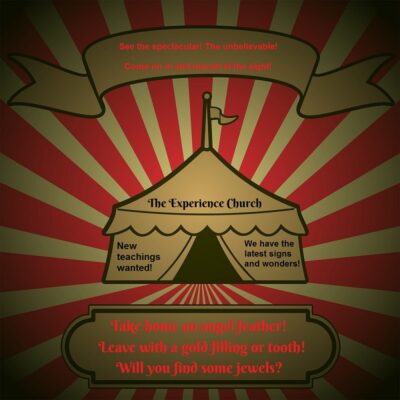Original post here. This is continued from Three Steps Part 2: That Old Time Liberal Religion. This happened about 1974.
1974 – A few months before we had moved from Vicksburg to Birmingham, from a small ranch house to a split-level ranch house, from a traditional elementary school to an “open format” elementary school, from the big Southern Baptist church in a small town to a big Southern Baptist church in the suburbs of a city. The least turbulent transition was the church. There was a distinct change in decor — the Vicksburg church had a huge mural of Adam and Eve being expelled from the Garden of Eden behind the baptismal font, quite unusual for a Protestant church but very welcome for wandering eyes to rest on. The suburban church had varnished pine boards, with nothing for a bored child to do but resist the urge to count them, for once they were counted, what else was there to do? Fortunately there wasn’t much boredom at that time, as the services were very similar. There was an emphasis on free will and God’s love to provide an answer to all our problems, on God’s expectation that we would stand on our own feet, work together, and get things done. The ideal relationship with God was the one described in the song above, although the song itself wouldn’t be composed for almost another decade. With intellect, love, and will-power, any problem could be solved. I had just turned eight; and I believed, I believed, I believed.
But church wasn’t only the calmest place in my life, it was the most intellectually stimulating. School was deadly dull, and there was no other place around me where people were having interesting, open-ended discussions about life’s problems. In the early 70s there were a ton of problems to discuss, and many people were getting all gloomy about them. But not the church, which was a haven of optimism and reason.
When we joined a few months ago, the preacher had welcomed us individually, shook my hand, and told me that if I had any problems I could come see him. When I felt comfortable there, I took him at his word. I must have just turned eight. My sister and I had been dropped off there for some children’s function, and I found the opportunity to speak to the minister alone in the sanctuary. I told him that Mom and Dad were doing things to us that they shouldn’t, and, maybe, he could talk to them and make them stop? The preacher thought for a moment and then asked if my father sang in the choir. Yes, he did. He asked if my mother was the treasurer of the PTA. Yes, she was.
He did not ask why I had requested an intervention.
Then he kindly explained things to me. He explained that since my parents were members of the church in good standing, they couldn’t possibly be doing anything wrong, especially not to their own children. If I thought that members of the church in good standing were doing something wrong, there could only be one explanation. Somehow I had become possessed by Satan, and Satan was inside me making me believe lies about my parents that could not possibly be true. Then he prayed to Satan to leave my body and stop plaguing my thoughts with such lies, and sent me on my way.
I was dumbfounded. I may have just turned eight, but even then I knew the only thing I was possessed by was the good sense to realize how ridiculous the preacher sounded. It was without question the single stupidest thing I had ever heard in my life, either in stories or in real life. But if he took it seriously, then that could only mean — dangerous things. I remember staring at the thumbs of his clasped hands in shock, not daring to look him in the face. Then my mind started to work.
This was a modern, liberal church in the early 1970s and he’s threatening me with Satan. I don’t think half the congregation even believes in Satan! It’s not a serious topic of conversation in or out of sermons. Here people talk about using love to solve real problems, they don’t threaten people asking for help with stuff that belongs in old movies. It’s like be threatened with leeches or water torture or — or footbinding or some other bit of antique nonsense.
But if there were even a tiny minority out there who actually believed such things, then I could never, ever tell anyone about my own spiritual experiences. I had never told anyone about talking to God because I had never met anyone who would have a positive reaction to the news. The negative reactions would fall into two camps, the ones who would want me shipped off to a loony bin and the ones who would want me burned at the stake. Of the two I figured I could talk my way out of the loony bin easier than I could talk my way off a burning stake. I seriously thought the latter camp only existed in old books, but apparently I was wrong.
That hurt. I’d been looking forward to talking to someone about it someday.
Obviously I couldn’t talk to any spiritual ministers about anything else going on in my life. And I had made a mistake not waiting until I knew someone long enough for them to trust me before asking them for help. Next time I would wait longer.
That was what went through my conscious mind at the time. For over 40 years whenever I consciously remembered it, that is all I thought about, that and the image of the thumbs of his clasped hands. It was not until I finally committed to writing about it after years of dithering that I realized my subconscious had ruminated on it for a long time, and reached conclusions that I did not fully realize were connected to this memory.
In my subconscious I realized other things as well. I realized that my parents could do anything they wanted to my little sister and I and no one would rescue us. According to the preacher, they weren’t the only ones. Any “member of the church in good standing” could do anything they wanted to us and if my parents didn’t stop them no one would. That meant no one would protect me not only from my father but from any man at church who wanted to abuse me in any way. It meant that the church would attract abusers who wanted to be “members in good standing” for the cover it provided for their abuse.
But it’s church, right? There can’t be many abusers there. At the time I believed that. I didn’t have any evidence of any other abusers — other than the preacher’s disturbing response.
Time would prove me wrong. The evidence would mount. And I would have a hard time feeling safe in a church ever again.
Meanwhile I had a decision to make. I was being abused at home, and apparently the larger community in the form of the my community’s spiritual leader thought that my abuse was the right and proper way of the world. Where did that leave me? At this point there were two things I could believe. Either 1) there was something wrong with me that made people think they could get away with treating me like shit, or 2) the whole damn system was screwed. I’ll take Door #1, Monty.
I can hear the chorus now. “You just wanted to be a special snowflake!” Nothing could be further from the truth. I knew that what distinguished the scapegoat from the rest of the herd was the mark that others placed on it. If I could figure out where the scapegoat’s mark was on me, I could wash it off and vanish into the crowd. If #1 was correct, that meant I could someday escape. If #2 was correct I could never escape an entire world that saw all children as suitable playthings for monsters. I originally chose to believe #1 not out of shame, despair, or any perverse pride; but out of a desperate, desperate hope. In time that hope would fade, and despair would take it’s place. In even more time I would realize that what I had refused to believe was true. The whole damn system was screwed and no one was doing anything to fix it.
And then I would begin to get angry.
But I was eight and still in the grip of Persephone’s cruelest demon, hope.
(It would be 41 years later before my husband pointed out the most disturbing part of that conversation: the preacher did not stutter or fumble his words. To the veteran schoolteacher that meant only one thing — he’d had plenty of practice on other girls and boys.)
Three Steps Out the Church Door: Leaving the Southern Baptist Church – Introduction
Three Steps Part 1: Recollection, Remembrance, and Discovery
********
Shop at our Amazon store! As an Amazon Influencer, this website earns from qualifying purchases.










